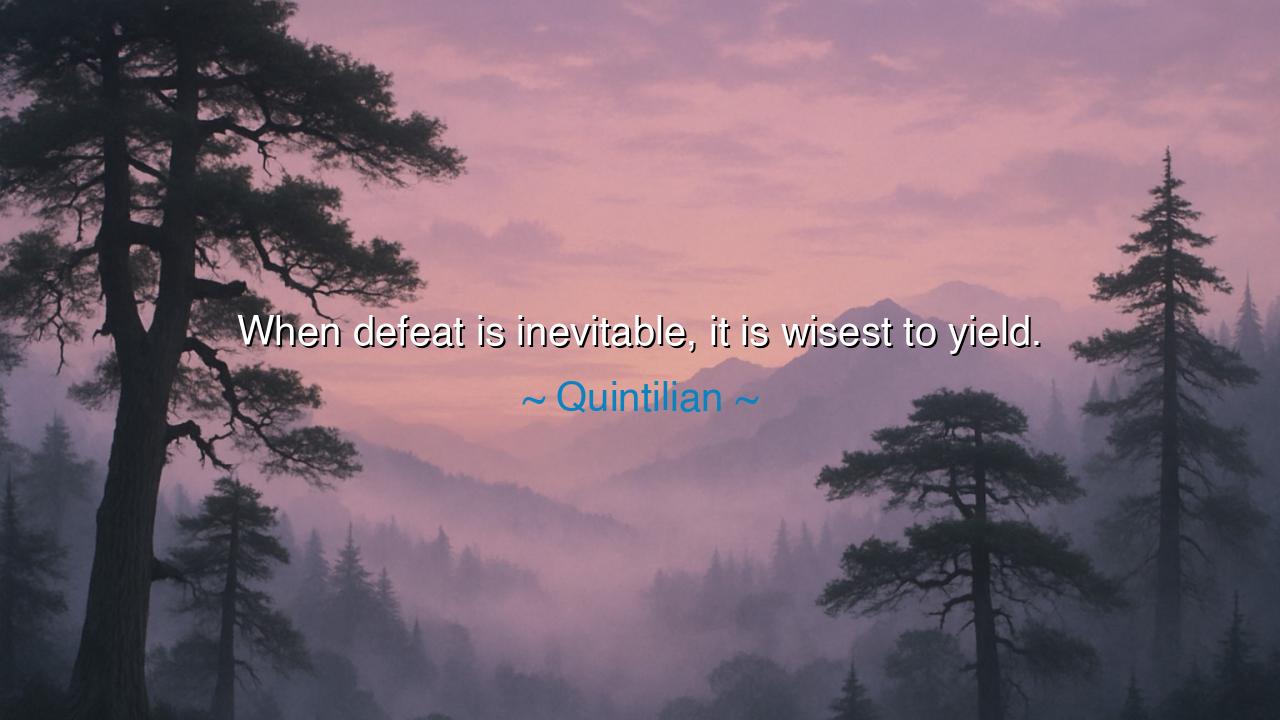
When defeat is inevitable, it is wisest to yield.






Defeat is a bitter draught, yet even in loss there is a path to wisdom. When Quintilian, the great Roman rhetorician, declared, “When defeat is inevitable, it is wisest to yield,” he spoke of the profound strength found in acceptance. His words do not glorify surrender born of cowardice, but rather the courage to recognize when a struggle can no longer be won. To yield in such moments is to preserve dignity, strength, and even the possibility of future victory, instead of being shattered by blind pride.
At the heart of this teaching is the art of discernment. Many warriors and leaders fall, not because their enemies are stronger, but because they refuse to see the truth. They fight past the point of reason, clinging to hopeless battles until all is lost. Quintilian urges us to act not with stubbornness, but with clarity. Yielding is not always defeat; it can be a strategic retreat, a way to live and fight another day. The wise understand that sometimes, survival itself is a victory.
History offers many vivid examples of this truth. Consider the legendary Hannibal of Carthage, whose genius nearly brought Rome to its knees. Yet, when Carthage’s forces were ultimately overwhelmed, its leaders failed to yield in time. Their refusal to accept inevitable defeat led to the city’s destruction and its salt-strewn ruins—a permanent symbol of pride’s downfall. Had they yielded with foresight, Carthage might have endured as a strong and prosperous ally rather than a memory burned into the pages of history.
In contrast, there are tales of those who embraced Quintilian’s wisdom. George Washington, during the early days of the American Revolution, faced a vastly superior British force. Instead of clinging to unwinnable battles, he chose strategic retreats, yielding ground while preserving his army. This patience allowed him to strike when the time was right, ultimately securing independence for his people. His actions show that yielding at the right moment can lead not to ruin, but to eventual triumph.
This teaching also applies beyond the battlefield. In the battles of daily life—conflicts of pride, ambition, or relationships—there are times when continuing to fight only deepens the wound. To yield is to release anger, to step back, and to preserve harmony. It takes greater strength to lay down one’s sword than to swing it endlessly in vain. Such surrender is not weakness but a profound act of wisdom and self-mastery.
Let this lesson echo through the ages: there is honor not only in victory but in knowing when to bow before forces greater than yourself. Yielding, when done with grace, transforms defeat into renewal. As Quintilian teaches, to fight blindly is to be destroyed, but to yield wisely is to live on, carrying the seeds of future greatness in the quiet strength of survival.






UGUser Google
I find this quote thought-provoking, especially when considering situations where giving up might seem like the easier option. It challenges the idea of stubborn persistence. But, how do we distinguish between yielding when it’s wise and quitting too early? Sometimes, it feels like there’s a fine line between accepting defeat and just avoiding hard work or challenges. Do you think this applies to all situations, or is it context-dependent?
YKYG Kenni
Quintilian’s quote strikes me as a reminder of the importance of pragmatism. It’s not always about fighting until the very end, but rather knowing when the battle is truly lost. However, I wonder if this can be applied to all situations. What about times when persistence in the face of defeat has led to unexpected victories? Can we always assume that yielding is the wisest option, or are there cases where holding on longer pays off?
TCTran Thien Chien
There’s a certain wisdom in this quote, but it also brings up a question: Does yielding mean giving up on everything, or can it be a strategic retreat to fight another day? I think knowing when to yield is as important as knowing when to stand your ground. Could it be that sometimes ‘yielding’ can actually lead to a better opportunity later on? I’d love to know how others interpret this.
DLNguyen Dieu Linh
This quote makes me think about how important it is to recognize when we’ve reached our limit. Yielding doesn’t always feel like the best option, but sometimes it can save us from further harm or wasted effort. I wonder, though—how do we know when defeat is truly inevitable? Is it always clear, or can we sometimes give up too soon and miss a chance to turn things around?